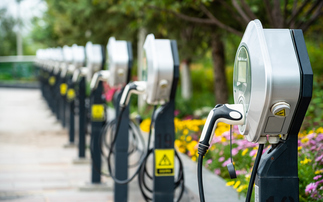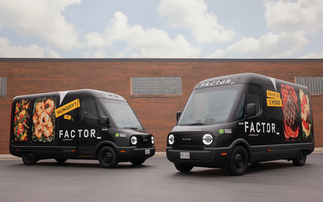This week's COP26 launch may have got off to a tempestuous start, but all the elements are there for a genuinely transformative and historic Summit, the Prime Minister just needs to articulate the net zero narrative
Now, that's more like it. The Prime Minister's official launch of COP26 may have oscillated between underwhelming and chaotic, leaving the 'summit to save the world' without a President, but the government still has an impressive story to tell when it comes to climate action and today it unveiled an interesting new chapter.
The announcement of a £50m funding competition to create England's first all-electric bus town is precisely the sort of policy intervention the government should be pursuing. It may not grab many front page headlines - buses rarely do - but this is a living, breathing example of the kind of mission-focused, catalysing clean tech investments governments should be making.
Yes, there is an inevitable element of 'postcode lottery' about such competitions, but the upsides massively outweigh the downsides. If funds are limited then they are often best focused on delivering something transformational rather than spreading support too thinly across the country. Moreover, by concentrating on delivering an entire local bus fleet the government creates both a pilot project to learn from and a template to follow.
With the global market for electric buses growing fast here is a chance to demonstrate that the technology works, that it delivers the advertised fuel savings, air quality improvements, and crucial grid balancing services. Answer those questions and prove that such buses are popular with the public, and then as the economies of scale drive down upfront costs you can more swiftly establish electric models as the default option for any fleet replacement project. Doing this all at scale in a single community gets the answers and case studies you need far quicker and more effectively than electrifying 10 per cent of a city fleet.
Moreover, this is an approach that can and should be turbocharged. I was speaking recently with leading energy analyst Michael Liebreich and he argued that the government should name a handful of net zero towns and cities - communities from different parts of the country, with different geographies and socio-economic circumstances - and seek to show how net zero emissions can be delivered at the system level. He's right, of course, we need some pioneering net zero communities as a matter of urgency. A network of COP Cities to go with a network of COP forests - or COP copses, if you will - could be one of the most important legacies of the Summit.
The frustrating thing in the wake of this week's somewhat bungled COP26 launch is that the government is so close to landing this kind of argument and delivering the requisite policy framework. Johnson may be an exceptional campaigner, but there are times when his reluctance to stick to the script only serves to undermine his message. The government seems to be frustrated that it does not get sufficient credit for the world-leading climate action it has taken, but why then does it not invest more time and energy in showcasing its achievements while further bolstering its credibility by admitting much more effort is required?
On Tuesday Johnson could have stuck to the line that Claire O'Neill was replaced because Number 10 realised a more experienced figure was required and admitted the government was rectifying its own mis-judgement about the scale of the task. It could even have offered O'Neill an ambassadorial role for the Summit, while accepting she may be reluctant to accept the demotion. Instead, it opted for the dark arts of character assassination by covert briefing.
At the same time Johnson could have clearly talked up the 'Net Zero COP' and unveiled the announcements that have come this week alone: a pulled forward petrol and diesel car phase out date that means you have likely bought your penultimate 20th century car; an earlier coal phase out date, with the UK showing the world how coal can be consigned to the history books; a report showing the UK can become a global hub for floating offshore wind technology; Sky going net zero and many more firms pledging to deliver 100 per cent EV fleets; Ofgem's commitment to drive grid decarbonisation; the first step on the path towards a fully electric national bus fleet; and perhaps even a reference about how Exxon's valuation is on the slide and Tesla's is soaring.
He then could have talked up what everyone knows is in the pipeline: a full Transport Decarbonisation Strategy; a sweeping Energy Whitepaper to mobilise offshore wind, nuclear, and energy efficiency investment; a transformative Agricultural Bill and green subsidy reform programme; a genuinely green Budget; a review of medium term Carbon Budgets to bring them into line with the net zero goal, a new NDC national climate action plan to submit to the UN; and a lot more besides.
All this could have been fully briefed to the press, extending far beyond the narrow press release on Tuesday vaguely explaining that a target to shift from petrol cars to EVs may be pulled forward to a point 15 years hence.
In short, the Prime Minister could have clearly explained what he hinted at in his successful election campaign - that the great animating post Brexit project for his administration is the pursuit of net zero emissions and the many economic, environmental, and infrastructure gains it will unlock.
He could have said with the upmost clarity that delivering a successful COP26 Summit will be supremely difficult, but that the message the hosts will offer to the world will be a plea for all nations to emulate the UK's net zero goal for the benefit of their citizens and economies. And then he could have taken questions and honestly explained where more action was needed and how trade-offs will have to be made.
Moreover, the Prime Minister could have helped neuter some of those inevitably hostile questions by delivering his message flanked not just by his Italian counterpart and Sir David Attenborough, but by FTSE100 bosses, union bosses, civil society leaders, his entire Cabinet, and, whisper it, his political opponents. He could have demonstrated that on this issue we really are all in it together.
In fairness, Johnson hinted at much of this. His Brexit and COP26 speeches were both notable for both their characteristic technoptimist and his honest admission that full decarbonisation will be difficult to achieve. But the lack of detailed policy commitments and in-depth background briefing, coupled with the reluctance to reach across Party lines and the drama of sacking one President without a replacement lined up, meant the message did not quite land.
As the government is now painfully aware a huge amount needs to happen to deliver a successful COP. Logistical challenges have to be addressed, partisan politics need to be parked, diplomatic efforts have to be turbocharged, and a new President has to be found. But a good place to start would be to talk a little less about historical figures and the esoteric delights of the green industrial revolution and a bit more about the humble electric bus.
They say you should campaign in poetry and govern in prose. But climate diplomacy requires a healthy mix of both.
A version of this article originally appeared in the BusinessGreen Overnight Briefing email, which is available to all BusinessGreen subscribers.









